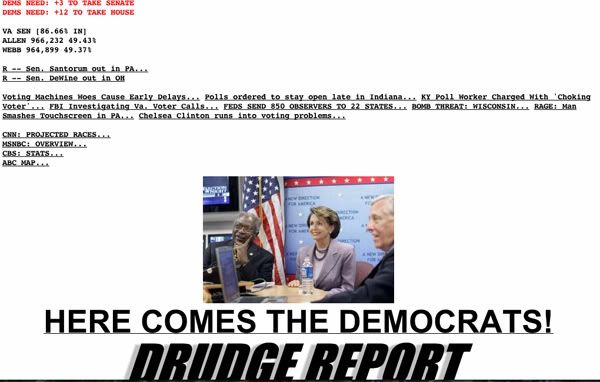In my post
on Thursday, I tried to do my best to cut through all the spin/conventional wisdom being formed around the Democratic victory this week. Far too many who have insulted or dismissed that party for years now insist on giving the party 'advice' and explaining to them what their victory means... For instance, a nonsensical NY Daily News editorial yesterday instructed the Democrats not to think they have some sort of mandate to do anything and also was quite insistent that they not start talking about timetables for withdrawals in Iraq (when in fact voters made it very clear this is what they wanted). Even conservative Tony Blankley noted on yesterday's 'Left, Right, and Center' on KCRW that President Bush didn't really win the 2000 election (Blankley called it a tie), but claimed a mandate anyway. So why don't the Democrats have a mandate after what even the President acknowledged was a "thumpin'"? I hope the Democrats are smart enough to know that they got this far by
not listening to the conventional wisdom of DC insiders and the media. People gave them a mandate for change, not just in Iraq, but to hold people accountable for the mistakes of the past six years, and for a change in the legislative direction of this country in a more forward-thinking manner.
One of the media narratives being played out is that the Democrats only won because of 'conservative' Democrats. This is just
not true. While it is true the Democrats are a more diverse party than the opposition, and have always represented the true center of the country in my opinion, the new Democratic majority is no less progressive than before. Yes, there are more 'red state' Democrats now, but that is a sign of Democrats expanding beyond their traditional terrorities, not of an ideological realignment, per se. Jim Webb is hardly George Allen.
One example of a 'conservative' Democrat that is brought up is Montana's Senator-elect Jon Tester. Blogger Atrios
looks at the 'conservative' agenda of Mr. Tester-
- Supporting renewable and alternative energy sources
- Raising automobile mileage
- Pro-choice
- Protecting public lands
- Country of origin labels for food imports
- Affordable health care
- Enforcing immigration laws for immigrants and employers
- gun rights
- A plan to end the war in Iraq
- Increasing the minimum wage
- Repealing the Patriot Act
- Changing Medicare D to allow price negotiation with drug companies
- No to social security privatization
- Pro stem cell research
- Middle class tax relief
With the sole exception of the gun rights issue (and the immigration one, to a lesser extent, but I think enforcing immigration laws is not an ideological position), this seems like an incredibly progressive, positive agenda to me. The Senator he ousted- Conrad Burns- would probably have a mental breakdown if even
half of this list got accomplished. So why is he called 'conservative'? Because, as Josh Marshall
points out, he is a farmer from Montana with a buzz-cut hairdo and therefore must be conservative. The media is neither conservative nor liberal, they are just intellectually lazy.
Atrios
notes elsewhere that "There was a time when the 'political center' had some actual meaning and some genuine relationship to voter preference, but it's now a concept which has been redefined to be equated with the elite consensus... The truth is any agenda that the Democrats are likely to work on is entirely mainstream, and this would probably be true even if they had an 80 seat majority in the House and a veto-proof majority in the Senate. Whether or not this mainstream agenda will be judged as 'centrist' by the sensible people who make such determinations I have no idea."
Or, as Alex Koppelman
stated, "Five antiabortion congressmen does not a revolution make."
If you listened to the concerned rhetoric about 'extreme' Democrats, you'd think
this was their agenda.
Moving on to intra-party Democratic dynamics, there is
a rumor, mostly false I hope (and started by a jealous James Carville), that some people inside the party leadership would like to see Howard Dean replaced as party chairman (the suggestion of Harold Ford-- who lost his race on Tuesday-- as a potential replacement is an odd addition to that rumor). I wanted to laugh that off, and also give Dean his due. Howard Dean, along with
many others, helped architect the new Democratic majority. He should be celebrated alongside Rahm Emanuel and Chuck Schumer, not talked about behind his back as if he were some sort of problem. If we note that the Democratic victory hinged on the election of many Democrats in traditionally Republican states, then Mr. Dean deserves double credit for the win, because it was his '50 state strategy' that accomplished that. Dean said last year (and many in the party leadership didn't want to hear it) that the reason the party hadn't been as successful as they should be was that they ignored every state that wasn't labeled 'blue' or 'swing'. They had taken Democrats, liberals, and independents in the 'red' states for granted and Dean noted that those states could be competitive if they simply went there and ran real races and didn't ignore those voters. He was proven correct. Democrats made their case in every state in the country and have expanded their base in the process. Swing states like Pennsylvania are bluer than ever, and traditionally red states like Montana and Virginia and Missouri, etc., could now be considered in the 'swing' category. This is a major achievement (and in only two years!) that not only won for 2006, but has major potential for expanding the base in the future. If people like Carville don't appreciate the scope of that, it is
they who should be shunned by the party, not Howard Dean.
Over in the U.K., however, Labour Party leaders
have drafted Dean to advise them on campaign strategy.
[PS- The new Democratic victory portends major changes on
responding to global warming and
tax policy, among other issues. January should be an interesting month as these issues got honestly debated for the first time in years.]




